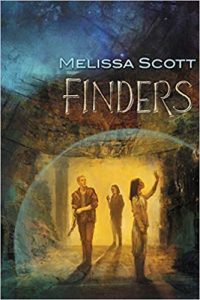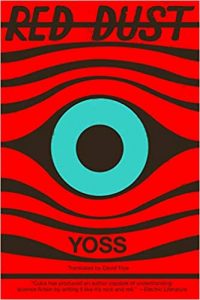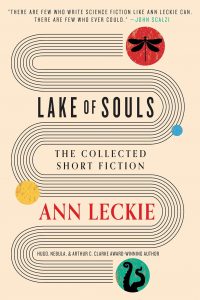Liz Bourke Reviews Finders by Melissa Scott
 Finders, Melissa Scott (Candlemark & Gleam 978-1-936460-88-5, $20.95, 372pp, tp) December 2018.
Finders, Melissa Scott (Candlemark & Gleam 978-1-936460-88-5, $20.95, 372pp, tp) December 2018.
I have to admit that I’m a fan of Melissa Scott, although I came late to her novels, and later still to her science fiction ones. Her work generally concerns itself in some way with personal relationships, and with social alienation, and with, in some several cases, movements or moments arising out of the solidarity of the alienated. Her worldbuilding is always fascinating, her novels atmospheric, and her main characters, with some few exceptions, are people who work for their livings: people with debts to pay off or a roof to keep over their heads, but who nonetheless enjoy their jobs.
Cassilde Sam, the protagonist of Finders, Scott’s latest novel (and her first non-tie-in science fiction novel since 2000’s The Jazz), follows the pattern of many of Scott’s previous main characters. She’s a salvage operator, barely solvent, with a ship – the Carabosse – that has a number of debts. She’s also dying of the incurable, degenerative Lightman’s Disease. She needs a find big enough to leave a legacy for her lover and partner, Dai Winter, so that at least he’ll be able to keep their ship.
The universe Cassilde lives in is one that has suffered not one, but two catastrophic civilisation-upending (civilisation-destroying, in part) events. Much of Cass’s civilisation’s technology is powered by salvaged Elements from the ruins of the mysterious Ancestors – the first civilisation known to have collapsed. These elements come in four types and are called after their colours: Blue, Gold, Red and Green, with Green being the rarest. Cass and Dai are good at salvage, but, with Cass’s increasing frailty, it’s hard for them to handle demanding jobs.
When Cass and Dai’s former lover and partner Summerlad Ashe appears from out of the blue, claiming to have information on a salvage claim – part of an orbital palace, recently opened for salvage bids – that he says contains potentially immeasurable wealth, Cass is desperate enough to take his word, and take him back onto their crew. Even though Ashe left them to fight on the other side of an interstellar war that ended only seven years ago, and even though Cass has a slow, sneaking realisation that she and Dai and he had perhaps different ideas about what their triad relationship actually constituted. Their new interactions are fraught with the weight of the past, but the find is everything Ashe promised – at least until pirates attack the claim and an injured Cassilde is forced to avail herself of an uncertain piece of Ancestor technology. In doing so, she receives one of the Ancestors’ Gifts. Rare to the point of mythical, these gifts confer healing and, in Cass’s case, because this Ancestors’ Gift is so powerful, hold out the potential for immortality.
It turns out that Ashe knew these pirates, and knows more about these Gifts than Cass does. Gifts can be stolen by killing the bearer and using their blood, and Cass is dragged into an underworld where Gifts are traded in blood and violence, and powerful Gifts mean that one is hunted by powerful enemies. Pursued by Ashe’s pirate ex-acquaintances, and facing the prospect of watching both her lovers – her family – die while she lives on if they can’t find (or won’t accept) Gifts themselves, things are looking pretty shitty for Cass. (The cure for her fatal disease is the only bright spot – but if her Gift runs out or wears off, the Lightman’s will return.) And that’s before she discovers that the same people pursuing her are also searching for the most powerful and dangerous of all the Ancestral artefacts, searching to unlock the god-like AI that the Ancestors created and were barely able to contain, after a struggle that resulted in humanity’s first Long Dark.
If Cassilde doesn’t beat her enemies to it, her pursuers might free them – destroying her own civilisation, and plunging humanity into a third Long Dark. Even if she does, she, Dai, and Ashe may not survive.
When I realised that Finders contained a “miracle cure” element I was a little worried, but Scott handles this aspect of her storytelling really well. Cassilde’s cure has costs, most of which she doesn’t discover until it’s too late. She’s plagued by the ethical uncertainty of the Gift-hunt into which she’s fallen, and also by the fear and uncertainty that the Lightman’s could return at any moment. And her Gift strains her relationships with Dai and Ashe, as all three of them have differing views on whether or not immortality is desirable – and her relationship with Ashe is undergirt (and undermined) by their class and cultural differences, the tensions of their estrangement, and the secrets that Ashe has been keeping.
The crew of the Carabosse keeps getting shot at, but interspersed with the moments of high tension and dramatic peril is a sense of everyday intimacy: Scott creates a deep, textured world, one that feels real and filled with the concerns of real people. And it’s one that’s also filled with the wondrous and extraordinary, as with the Burntover and the enormous, mysterious, abandoned Successor space station of Callambhal Above. Finders has mythic depth, is what I’m saying, but its characters are relatable on very human levels. Cass is a fascinating and engaging protagonist, and her relationships with Dai and Ashe are appealing, interesting, and scuffed (and sometimes fucked up) in very human, very believable, and very compelling ways.
Finders is a tremendously enjoyable space opera ride. It’s full of adventure, full of heart, and really full of fun. I loved it, and my one complaint is that there aren’t many more novels in this setting with these characters. (I want there to be more.) I recommend it wholeheartedly – if you enjoy space opera, I think Finders is going to give you something to like, if not to love.
Liz Bourke is a cranky queer person who reads books. She holds a Ph.D in Classics from Trinity College, Dublin. Her first book, Sleeping With Monsters, a collection of reviews and criticism, is out now from Aqueduct Press. Find her at her blog, her Patreon, or Twitter. She supports the work of the Irish Refugee Council and the Abortion Rights Campaign.
This review and more like it in the January 2019 issue of Locus.
 While you are here, please take a moment to support Locus with a one-time or recurring donation. We rely on reader donations to keep the magazine and site going, and would like to keep the site paywall free, but WE NEED YOUR FINANCIAL SUPPORT to continue quality coverage of the science fiction and fantasy field.
While you are here, please take a moment to support Locus with a one-time or recurring donation. We rely on reader donations to keep the magazine and site going, and would like to keep the site paywall free, but WE NEED YOUR FINANCIAL SUPPORT to continue quality coverage of the science fiction and fantasy field.







I definitely agree! I’m loving Finders (1/3 to go). Really miss Melissa Scott’s Sy-Fi work (Night Sky Mine is a favorite; her AI characters are practically human ;-). Finders also reminds me a little of Elizabeth Bear’s new novel “Ancestral Night”; another wildly enjoyable and full-of-heart space ride. Here’s hoping Melissa writes some more for us! Cheers!